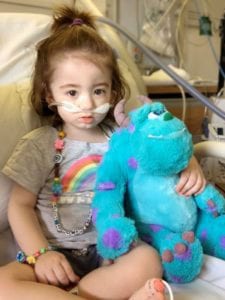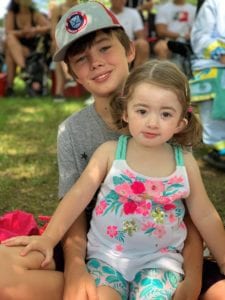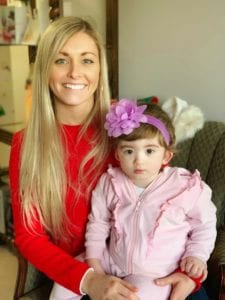Click here for Part 1 of Aunika’s Story
Despite the success of the transplant, baby Aunika wasn’t out of the woods yet. She continued to have issues with breathing and swallowing –causing the family to keep a close ear and panic at the first sound of choking. Aunika also was still extremely vulnerable to bacteria and viruses after her surgery.
 A thymus transplant doesn’t result in an immediate immune system- it takes time for T-cells to receive a proper education from the thymus in how to protect the body. This was a point of confusion for the family’s friends and peers. They had the impression that a transplant would bring someone very close to normalcy quite quickly.
A thymus transplant doesn’t result in an immediate immune system- it takes time for T-cells to receive a proper education from the thymus in how to protect the body. This was a point of confusion for the family’s friends and peers. They had the impression that a transplant would bring someone very close to normalcy quite quickly.
Aunika’s older brother had learned all about his sister’s treatment and condition, but found it difficult to explain to his friends.
Maggie went to his class one day and directed an engaging reenactment of how an immune system works, getting the whole class involved. She had some kids act as T-Cells, others as bacteria and viruses, and finally a thymus princess who directed the T-cells. This activity helped the class to understand what his sister had been going through, and after that, they would ask him how her T-cells were doing.
Inspired by the success of the classroom presentation, Maggie hired a cartoonist who she explained everything to so that he could illustrate the dramatization. Now there is a tangible booklet that she and other families can give to teachers to help explain the condition to their classes.

Aunika’s brother has become a strong advocate, even speaking alongside his mother at a Rare Disease day event.
It has been two full years since Aunika’s transplant and her family has been adjusting to their new normal. Aunika has had follow up testing done locally in Canada and the results sent to her team at Duke. The family has remained extremely vigilant about what she is exposed to and have hired a nanny with a background in respiratory therapy.
Maggie is filled with longing sometimes, when she sees other parents in the grocery store, trying to keep their children from misbehaving.
She wishes Aunika had the chance to misbehave between the aisles too. It is painful that she can’t take Aunika with her because it wouldn’t be safe for her to be exposed to the germs, or because she’s in the hospital. Aunika still has respiratory and feeding issues, but her doctors are hopeful they will improve with time. She uses a hearing aid and for now, continues to rely on a feeding tube.
Aunika has recently been cleared to receive vaccines and the family is thrilled that Aunika will be able to attend school in the future. They know she’s a bright child who will do well.
“It’s the little things that matter, that are cause for celebration. I wouldn’t change a thing. We don’t take anything for granted anymore. She’s changed our life for the better.” – Maggie
They have all come a long way from those initial, terrifying, weeks in the hospital following Aunika’s birth.
“I want to make sure no other parents have to go through what we went through. I don’t want anyone else to hear that there’s nothing that can be done. So many doctors don’t know about thymus transplantation and that it works.
We had no one who truly understood our situation or who could give us advice about decisions. I want other parents to have someone to talk to. I want my number given to anyone who is going through this.
I want people to be educated so that no other kids have to pass away. With the communication capabilities we have now, that shouldn’t happen anymore.” – Maggie
Maggie has been on a mission to educate and advocate. She has met with the CEO of Enzyvant, which is funding thymus transplantation research, and shared her family’s story.
She has been a speaker at events and been able to meet with other families. She found the Jeffery Modell Foundation to be an excellent resource and frequently refers families to them.
“It’s been an incredible journey-I’ve met so many incredible people.” – Maggie
Her primary advice for families preparing for a thymus transplantation are:
“Make sure your doctor is in contact with the Duke team. A lot can get lost and you are your child’s main advocate. Don’t assume the doctors will do everything that needs to done,-they have other patients and they are human- you have to be on top of things to make sure communication lines aren’t getting crossed. Appreciate all the little moments and don’t let the fear consume you. If that’s the energy you’re projecting that’s what you’ll bring in. Be strong and have a positive outlook. Everything happens for a reason.”- Maggie

Maggie hopes to start a foundation specifically for those impacted by athymia. She envisions the organization will revolve around education, advocacy, and financial support. Maggie and three other mothers of athymia children are now working together to make this vision a reality, as a team.
“I want to ensure that my daughter and other children living with a condition that is not easily understood, live long and happy lives.”- Maggie
To read more about Maggie’s family check out her blog, Cupcakes and Hockey Skates.


